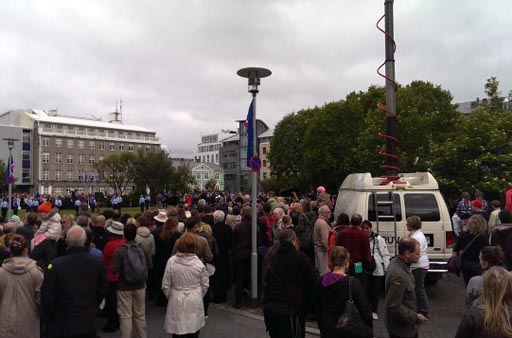EU politics:
calling the EU bluff
In that context, last month's halt to EU accession negotiations, announced by Sigmundur Davíð Gunnlaugsson, the newly-elected prime minister of the independent state of Iceland, was of more than just of local significance. This, alongside Norway and Switzerland, which had also turned away from membership, marked another blow for the self-confidence of the "colleagues", who had failed to convince the Icelanders of the merits of political union.
The decision was formally announced to the European Commission by the country's foreign minister, Gunnar Bragi Sveinsson, saying crisply, that, "This is how democracy works". Both main parties in the recent general election had been against EU accession.
A significant factor in the rejection had been the fate of Iceleand's fish stocks, which would have become a "common resource" under the EU's Common Fisheries Policy. And now, to confirm the vital role of fishing policy in that decision, we have Gunnlaugsson telling a Reykjavik crowd (pictured above) that the mackerel fishing dispute with the European Union as a prime example of the value of sovereignty.
Gunnlaugsson was speaking during Iceland's National Day, marking its birth as an independent nation in 1944. He declared that the EU's demands that Iceland reduce its mackerel catch showed why the country needs to maintain its independence.
"To apply illegal sanctions against a small nation for catching fish in accordance with scientific guidelines and within its own economic zone, at the same time as larger nations are making catches from the same stocks without any criticism being voiced", said Gunnlaugsson, "would hardly promise well for a common fisheries policy".
Only from that stance could Iceland have responded to the latest round of bullying with such equanimity. Last week saw EU fisheries commission Maria Damanaki visit the island, threatening to impose sanctions unless the Icelandic government agreed to immediate negotiations.
Dead-batting this bluster, fisheries minister Sigurður Ingi Jóhannsson calmly told her that Iceland had "expressed its sincere willingness to return to the negotiating table as soon as possible in order to find a fair solution to this dispute", but has since done absolutely nothing to resolve the Commissioner's angst.
Well might Iceland take the EU's threats calmly. As have the cod moved north into sub-Arctic waters, so have the mackerel moved north into Icelandic waters, giving the Icelanders every right to increase their quotas, which indeed they have done.
As we explained earlier, Iceland is more right than wrong and, if the EU had a good case for imposing sanctions on Iceland, and the neighbouring Faroe Islands, it would have acted already.
Were either fishing nation in the EU, of course, there would be no possibility of them arguing with the all-powerful fisheries commissioner. Quotas would have been decided in Brussels, alongside national allocations, and that would have been the end of the matter.
Farcically, though, one interested party left out of the discussions is UK fisheries minister Richard Benyon. Although he represents the strong Scottish interest in the mackerel fishery, he does not have a seat at the "top table" and has no power to negotiate directly with the Icelanders or even the Faroese.
There can be few better illustrations of the fatuity of Mr Cameron's "top table" claim than the sight of Gunnlaugsson seeing off the EU, while Mr Benyon has to go cap-in-hand to Brussels to be given his marching orders by Maria Damanaki.
COMMENT THREAD
Richard North 19/06/2013






















